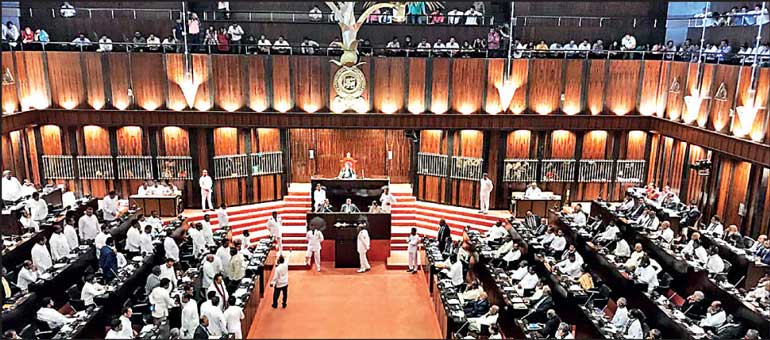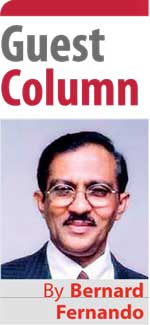Tuesday Feb 17, 2026
Tuesday Feb 17, 2026
Saturday, 12 February 2022 00:00 - - {{hitsCtrl.values.hits}}

 As an avid follower of the ongoing ‘Constitutional and Electoral Reforms’ process, I read the recent well-intentioned, captioned article in the press with interest.
As an avid follower of the ongoing ‘Constitutional and Electoral Reforms’ process, I read the recent well-intentioned, captioned article in the press with interest.
In short, the proposal (assuming the existing party system in place) seeks to install a system of ‘Participatory Governance’ through an alternate ‘Executive Committee’ system, in line with the Donoughmore Constitution, to rectify the so called ‘ineffectiveness’ of the existing ‘All party- Parliamentary Committees’ such as COPE, COPA, and Ministerial Consultative Committees. For the purpose of record, we may include ‘Public Petitions Committee’ and ‘Party leader Meetings’ too amongst the plethora of several other parliamentary committees which do not capture the public eye.
In passing, it may be mentioned that ‘Independent Commissions’ such as ‘Public service Commission’, Elections Commission, Audit Commission, Bribery Commission, Procurement Commission and Human Rights Commission too are designed to play supportive roles towards smooth implementation of the existing parliamentary procedures.
The proposer also adduces ‘non-mandatory participation by committee members’ as the main reason for the stated ‘ineffectiveness’. The writer is made to understand that almost all parliamentary committees are open to membership by all parties in proportion to the number of seats they occupy in the parliament. Therefore, the onus is on the party leaders to see that all their members are effectively represented in one or more of the several committees.
Be that as it may, the proposal, quite rightly and faithfully envisages to:
i) Make the Parliament a result-oriented body.
ii) Enable each and every MP irrespective of political hues to perform a tangible and a responsible role in the Parliament in the eyes of the electorate.
iii) Arrest ‘cross-overs’ by frustrated MPs.
iv) Stop politicising the Public service.
v) Stall political preference, influence and interference in deciding on appointments, projects and awarding contracts.
vi) Install two well constituted commissions to deal with policy planning and ethnic issues.
Comments and further recommendations
1) As stated above, the proposal is very objective and basically seeks to replace the ‘ineffective’ existing ‘Parliamentary Committees’ with ‘Executive Committees’ purportedly covering all Ministerial subject areas and summoning mandatory inclusion of all MPs as members in one or more of such committees. Such an intensive and focused approach will surely lead to more accurate and balanced decisions at the extensive open deliberations and debates in the House. The moot point however is, if the MPs are not honest and educated ‘political professionals’ committed to serve the ‘country first’, the Executive Committees too are bound to fail. Therefore, it is essential to ensure the quality of our MPs by legally enforcing suitably framed eligibility criteria and structured Interview systems on contesting political parties for selection of their candidates in merit order. Advent of ‘political professionals’ such as lawyers, accountants and economists in large numbers to the Parliament will surely promote ‘Country-First’, constructive, consensual debates by persons maintaining decorum of the supreme Parliament. (Honesty, morality and positive attitudes are vital expectations of sovereign voters)
If MPs imbued with such qualities were present in the previous parliaments, we could surely have witnessed effective and productive ‘Parliamentary Committees’ yielding a prosperous Sri Lanka by now! Unfortunately, it was prevented from becoming a reality, by the virtual conversion of the despicable ‘Optional Preference voting system’ into a perceived ‘Compulsory voting system’ by the power-hungry party hierarchies. Their sole criterion was to select notorious individuals enriched with ill gotten money who could bribe the poor and gullible voters and win votes for the party while totally ignoring the more critical party manifestos (which too were unfortunately replete with false and utopian promises).
As a result, uneducated village thugs and some popular actresses and sportsmen too occupied the precious seats in the Parliament. Therefore, the ignominious Preference voting system should be abolished forthwith and replaced by ‘District/Electorate wise Party merit lists’ allowing automatic election of ‘Horses’ instead of proverbial ‘Donkeys’!
2) For effective involvement of 225 MPs in the proposed ‘Executive Committees’ it is important to ensure their regular attendance at meetings. Towards such end, they must reside closer to the National Parliament and concentrate mainly on their role as lawmakers and guardians of the country’s finances approving prioritised budgets while serving in the Executive Committees as patriots engaging in fruitful and consensual debates placing the country first at all times! Also, in the absence of the ‘Preference Voting’ system, the necessity will not arise for MPs to make regular, long treks to their electorates in luxury vehicles to protect the so called ‘Vote Banks’! However, they shall monitor the end use of funds and work done with the decentralised budgets by following up and attending ‘District Development Committee’ meetings.
3) The decentralised Political Administration spearheaded by the Provincial Governors and the local Government authorities shall implement the respective Party manifesto (to be issued as a prosecutable document) utilising the Parliament approved Budget votes under active supervision of the Executive President whose main role shall be to ensure full execution of the avowed tasks.
4) Last but not the least, reach the ultimate level of ‘Sri Lankan-ness’, by applying PR arithmetic to allocate the constitutionally specified No. of Cabinet (30) and State (40) Ministry portfolios, so that all seat winning parties will be represented in a truly national Cabinet. The portfolios shall be assigned by consensus among Party leaders, President and the PM.
A Cabinet shared by all seat winning Parties, will surely remove the hackneyed ‘Sinhala Govt.’ label and the country can boast of a ‘Permanent Sri Lankan National Govt.’ in practice.
Note: The aforesaid recommendations together with more related ones have already been submitted as a package by the writer to the ‘Experts Committees to draft a New Constitution’ and the ‘Parliamentary Select Committee on Electoral Reforms’ well before the deadlines.
Conclusion
The proposed changes to parliamentary procedure will no doubt require changes to the standing orders while the recommendations by the writer will elicit changes to election laws and constitution. Towards this end, concerted efforts by all political parties interested in placing the country above personal gain and aggrandisement plus active participation of civil society are sine qua nons to protect our nation from further degeneration.